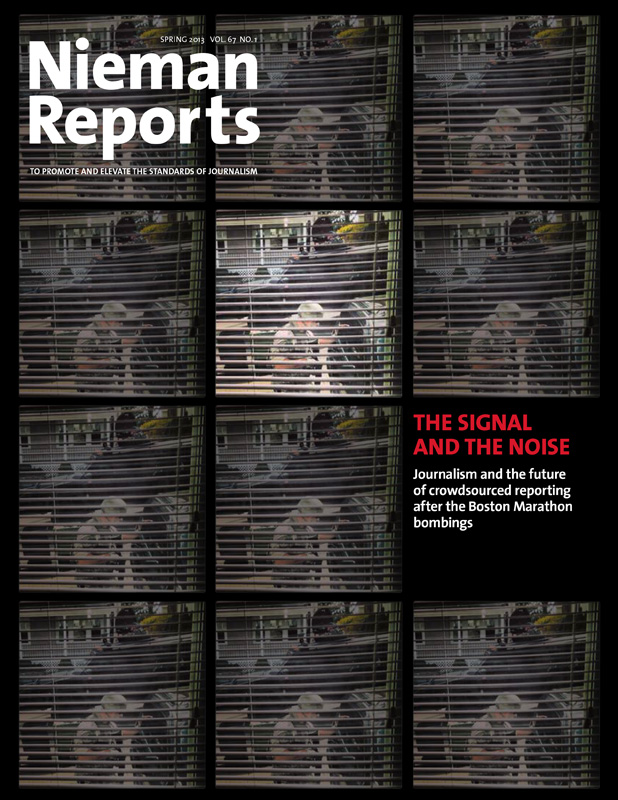There is a thirst for investigative journalism in the great American traditions of the late I.F. Stone and Murrey Marder, but around the news industry the question asked is always the same: Who will pay for it? Start with that question, and predictable answers always come up: paywalls, nonprofit grant givers, and government or private sector subsidies. But that’s the wrong question, and those are the wrong answers. As a result, the wrong things get funded, ultimately defeating our quest for a free, independent and potent press.
The question we should ask, as an industry and as champions of the investigative tradition, is: How can we best take advantage of the Internet’s amazing potential? What old sacred cows can be tackled to find new ways of exposing corruption, misdeed, and waste, while involving more people to ask more questions?
At MuckRock, the investigative news start-up I founded three years ago, the early answers were rooted in my own failures. My public records requests were routinely ignored or rejected by my local Ithaca, New York police department. My options were few at the time. I could, theoretically, hire a lawyer to work on an appeal. I could write an article blasting the non-responsive agency. Or, like most records requesters, I could walk away empty-handed in defeat. I did the latter.
But years later, I conceived MuckRock with a simple mission: To build a way for journalists, researchers and the general public to easily and quickly file public records requests and then make the results—everything from the initial request to the agency response time to the final documents—public. The site takes advantage of everything the Internet does well. It automates request writing and follow-up, taking away confusion for first-time requesters and tedium for regular document hounds. It helps connect the public with requests they favor (anyone can “follow” a public records request filed through MuckRock, unless the requester has embargoed it), putting many eyes on every agency that might otherwise stonewall. It puts traditional, trusted tools of journalism into the hands of everyone, letting activists, academics and veteran reporters work together, offering advice while building up a library not just of public documents but also the techniques to get them.

MuckRock users broke news about the purchase of drones with public funds. Photo by Gerald L. Nino/U.S. Customs and Border Protection
Too many news organizations opt out of finding creative ways to ask their audiences to help and fund their investigative journalism and so miss out on new revenue streams and new stories that give voice to those who need it most. MuckRock users have broken news about the Air Force blocking NYTimes.com from its network for reporting on WikiLeaks, about how cities across America, using Homeland Security funding, have secretly purchased drones, and much, much more. MuckRock is also a service many are happy to fund, often at the $40 per month “Professional” level, meaning we can continue to provide serious investigative work without paywalls or advertising—all because we asked the right questions.
So what questions should we be asking? Here are a few to get started. What skills can we offer the community to help them address their problems, and how can we help them showcase what they find? What “dream data” does our newsroom wish it had, and how can we not only get it or make it, but also share it with an audience (however small) that would be passionate about it? Where are readers criticizing our coverage, and how can we put the ball back in their court by helping them get and analyze documents or data or by giving them a voice that is more directed than an open comments field?
I believe we are on the verge of another golden age for reporting. But like all stories, this one must begin by asking the right questions.
Michael Morisy is the co-founder of MuckRock.com, an investigative news and research tool that helps individuals and organizations file, track, share and analyze public records requests.
MORE ON WATCHDOG REPORTING
From Shoe Leather to Big Data: ProPublica and the Future of Watchdog Journalism
By Robin Fields
Truth or Consequences: Where is Watchdog Journalism Today?
By Dan Froomkin
No Profession for Lone Wolves: Watchdog Reporters Need to Work Together
By Stuart Watson
Cross-Border Collaboration in Watchdog Journalism
By Stefan Candea
Let the Readers Know: How Journalists and the Public Can Work Together
By Ken Armstrong
In Korea, Watchdog Journalism Worth Watching on Television
By Chong-ae Lee
Do the Right Thing: Watchdog Reporters Handle a Bombing in Philadelphia
By William Marimow
Our Communities Crave Watchdog Journalism
By Raquel Rutledge
The question we should ask, as an industry and as champions of the investigative tradition, is: How can we best take advantage of the Internet’s amazing potential? What old sacred cows can be tackled to find new ways of exposing corruption, misdeed, and waste, while involving more people to ask more questions?
At MuckRock, the investigative news start-up I founded three years ago, the early answers were rooted in my own failures. My public records requests were routinely ignored or rejected by my local Ithaca, New York police department. My options were few at the time. I could, theoretically, hire a lawyer to work on an appeal. I could write an article blasting the non-responsive agency. Or, like most records requesters, I could walk away empty-handed in defeat. I did the latter.
But years later, I conceived MuckRock with a simple mission: To build a way for journalists, researchers and the general public to easily and quickly file public records requests and then make the results—everything from the initial request to the agency response time to the final documents—public. The site takes advantage of everything the Internet does well. It automates request writing and follow-up, taking away confusion for first-time requesters and tedium for regular document hounds. It helps connect the public with requests they favor (anyone can “follow” a public records request filed through MuckRock, unless the requester has embargoed it), putting many eyes on every agency that might otherwise stonewall. It puts traditional, trusted tools of journalism into the hands of everyone, letting activists, academics and veteran reporters work together, offering advice while building up a library not just of public documents but also the techniques to get them.

MuckRock users broke news about the purchase of drones with public funds. Photo by Gerald L. Nino/U.S. Customs and Border Protection
Too many news organizations opt out of finding creative ways to ask their audiences to help and fund their investigative journalism and so miss out on new revenue streams and new stories that give voice to those who need it most. MuckRock users have broken news about the Air Force blocking NYTimes.com from its network for reporting on WikiLeaks, about how cities across America, using Homeland Security funding, have secretly purchased drones, and much, much more. MuckRock is also a service many are happy to fund, often at the $40 per month “Professional” level, meaning we can continue to provide serious investigative work without paywalls or advertising—all because we asked the right questions.
So what questions should we be asking? Here are a few to get started. What skills can we offer the community to help them address their problems, and how can we help them showcase what they find? What “dream data” does our newsroom wish it had, and how can we not only get it or make it, but also share it with an audience (however small) that would be passionate about it? Where are readers criticizing our coverage, and how can we put the ball back in their court by helping them get and analyze documents or data or by giving them a voice that is more directed than an open comments field?
I believe we are on the verge of another golden age for reporting. But like all stories, this one must begin by asking the right questions.
Michael Morisy is the co-founder of MuckRock.com, an investigative news and research tool that helps individuals and organizations file, track, share and analyze public records requests.
MORE ON WATCHDOG REPORTING
From Shoe Leather to Big Data: ProPublica and the Future of Watchdog Journalism
By Robin Fields
Truth or Consequences: Where is Watchdog Journalism Today?
By Dan Froomkin
No Profession for Lone Wolves: Watchdog Reporters Need to Work Together
By Stuart Watson
Cross-Border Collaboration in Watchdog Journalism
By Stefan Candea
Let the Readers Know: How Journalists and the Public Can Work Together
By Ken Armstrong
In Korea, Watchdog Journalism Worth Watching on Television
By Chong-ae Lee
Do the Right Thing: Watchdog Reporters Handle a Bombing in Philadelphia
By William Marimow
Our Communities Crave Watchdog Journalism
By Raquel Rutledge



